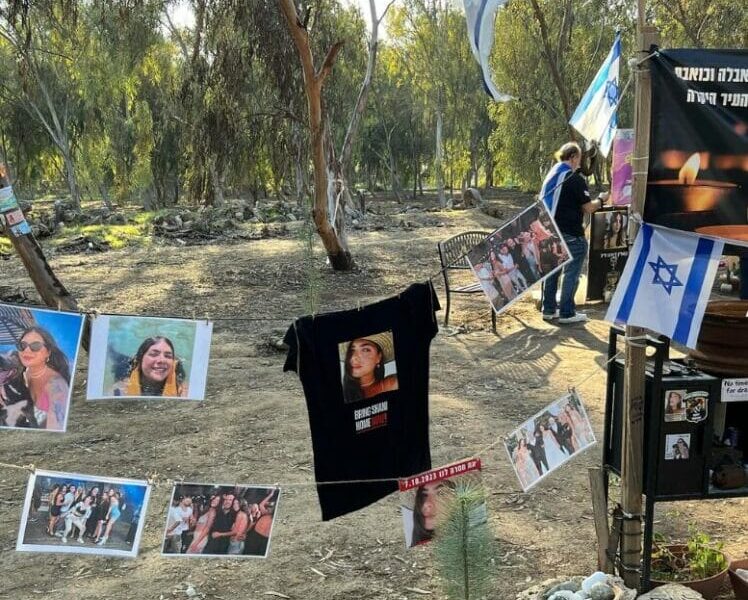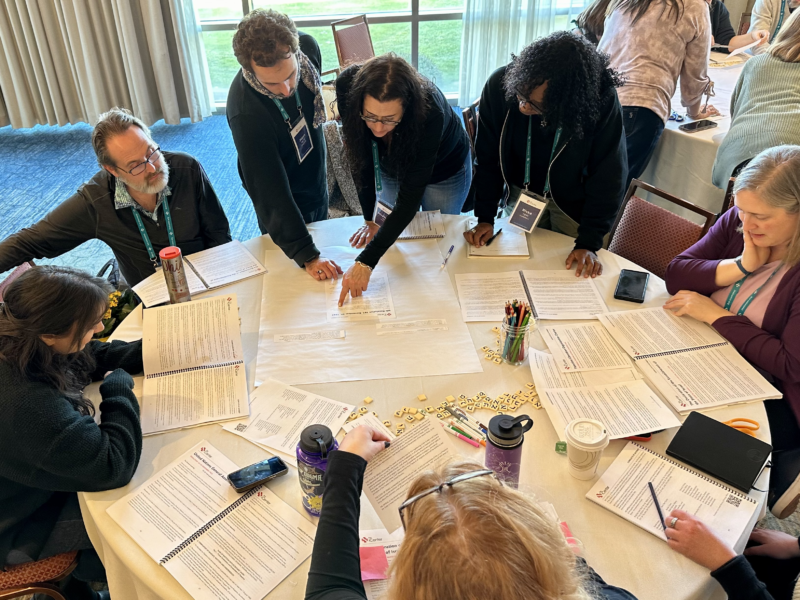Yom Kippur is always a challenging day, although I am not sure that all the reasons I find it challenging are the traditional ones. The rigors are many: fasting, going to the neighborhood shul for Kol Nidre, Yizkor and Ne’ila while trying to keep an eye on my kids, who, like most other secular children, enjoy the mass bike- and trike-athon that takes over Israel’s vehicle-free streets and highways on this day.
But there is more melancholy felt here each Yom Kippur. I cannot escape the oppressive feeling that hovers in the air due to the trauma of the Yom Kippur War. On Yom Kippur I cannot help thinking about the thousands of young Israelis who either woke up for the last time on Yom Kippur 1973, or who saw their home and families for the last time before racing to join their frantically mobilizing reserve units. I was a 15-year-old Portlander at the time, but I still have a vivid memory of overhearing a conversation in the foyer of Neveh Shalom during Yom Kippur services between two of my late parent’s contemporaries, Milt Horenstein and Dr. Milt Hasson. I recall overhearing them saying that the Arabs have launched a surprise attack and the situation is not good. I will never forget that sentence and the distress in their voices, because it was so alarming and in such brutally stark contrast to my image of Israeli invincibility.
This year the somber feeling was more pronounced as we mark the 40th anniversary of the war. Israelis have been “commemorating” the most traumatic conflict in Israel’s history with reunions of army units and TV and radio programs offering new revelations about those terrible days in early October 1973. Additionally, riveting testimony by Golda Meir, Moshe Dayan and others to the Agranat Commission, which in 1974 deliberated to determine the causes behind Israel’s lack of preparedness at the outset of the war, was recently declassified and published. That lack of preparedness made Israel’s eventual overwhelming victory so much more costly in lives than it needed to be and shattered the Israeli psyche so severely that the effects are still noticeable today, despite the ultimate formidable military achievements.
Meir’s testimony reveals how the military leadership belittled Egyptian President Anwar Sadat and illustrates Meir’s absolute confidence in the erroneous assessment of the head of IDF intelligence, Major-General Eli Zeira, that an attack was highly unlikely. None of the ministers nor military chiefs proposed calling up the reserves until war actually broke out. Perhaps most importantly, her testimony reveals how she, as prime minister, was unable to exert her authority over the minister of defense and chief of staff to order a mobilization prior to the attack as evidence piled up of an impending assault. Perhaps the most revealing testimony came from the Woodrow Wilson Institute in Washington, which publicized reports from the emergency meetings that took place in the first days of the war. The IDF was barely holding on in the Sinai and the Golan with the battered, but heroic, remnants of the badly outnumbered regular units until the reserve units could be mobilized and equipped to enter the battle. It shows just how bleak the initial situation was. According to Arnan Azariyahu, the chief aide of cabinet minister Moshe Galili, Defense Minister Moshe Dayan was purportedly desolate with an understanding that Israel was on the verge of being overrun. Dayan, the hero of 1967, epitomized the worst of the post-67 hubris – dismissing both the Arab military threat and potential peace overtures, while cultivating almost a cult of personality in the hedonistic heyday that infected Israeli society between the wars. According to Azariyahu, Galili told him that Dayan said “it took us 200 years to establish the third commonwealth, and now we’ve squandered it in 25 years.” Galili recounts that Dayan even raised the option of revealing Israel’s alleged nuclear capabilities, which would stop the Arabs in their tracks or motivate the Russians to stop them. Golda Meir, probably realizing where her reliance on Dayan had led, told him to stand down. Israel does not officially acknowledge or comment on its alleged nuclear arsenal, and any Israeli who does so can be prosecuted for jeopardizing Israeli security.
The IDF did indeed turn the tide, with the help of the American airlift. The unparalleled bravery and sacrifice of the simple soldiers and junior officers literally saved the nation with their bodies
and souls. Perhaps only the cease fire prevented Israel from entering Damascus in the north and from completely annihilating one-third of Egypt’s armed forces, who were surrounded on all sides.
Israel’s Yom Kippur counteroffensives are hailed and taught in military academies. This brings me to my other vivid memory of the war, which occurred in my first moments in Israel. In May 1974, my parents organized a tour for friends and relatives around the bar mitzvah of my younger brother. They flew over a few days before me. When I landed, my mother, along with Portland’s legendary Hebrew school teacher, Ceil Ettinger, picked me up at what was then Lod Airport. With Ceil driving to Tel Aviv on the old highway, I was astonished at the sight of hundreds, maybe even a thousand, captured Russian tanks, armored vehicles and trucks parked on the side of road along most of the 10-mile route.
Despite the victory, the trauma of the surprise coupled with the deaths of 2,600 soldiers and the injury and maiming of 8,800 changed Israel forever. To understand the true impact on the population, an Israeli-based blogger with a background in studying the impact of casualties on unit cohesion and combat effectiveness calculated what Israeli losses from the war looked like in an American context. The calculations are shocking. Killed: 179,200; wounded: 563,400. He added: “Americans killed in action in Vietnam totaled 58,286, with more than 57,000 of these over an eight-year span. In American terms, the Yom Kippur War was as if America had experienced all its losses in Vietnam within a single week, with one further difference. Vietnam was halfway around the world. North Vietnam had not declared war on America or vice versa and they were not in the business of killing ordinary Americans going about their business at home.”
For Israelis, it was more than just a loss of innocence. The tried and proven Israeli security doctrine formulated by David Ben-Gurion of advance warning, pre-emptive attack and creating deterrence collapsed because the first condition was nonexistent. The result was as Avner Hopstein of Walla.co.il wrote: “A psychological scar that will never heal. The limp that one tries to hide…this doesn’t relate to the military humiliation of the first days, because that has received plenty of catharsis through successful operations since and the end of the war was a resounding military victory emerging after a disastrous failure. Nor does it relate to the intelligence failure which actually has some benefits such as reducing hubris, improved advance warning and an understanding that saying ‘not a chance’ shouldn’t be given a chance. … So maybe we should embrace the memories and conclusions of that war. Not the early fiasco or the end result, but simply an acknowledgment that this scar might never heal and we should just concentrate on insuring it doesn’t re-open.”
It is this scar and the war’s lessons, along with the timing of the dramatic alleged nuclear revelation declassification, precisely when Iran has launched its charm offensive at the UN to try to lift economic sanctions while continuing to build a nuclear bomb, that converge to illustrate Israel’s never-ending struggle on multiple fronts. The Yom Kippur War was responsible for the greatest number of Jewish deaths since the Holocaust. Being an Israeli for 32 years, I believe I know this nation. Between 1967 and 1973, I believe the vast majority of Israelis (not the military and political elite) had a genuine feeling that the 1967 war was the last war that would need to be fought, that Israel’s survival, something which all Israelis were not certain of prior to 1967, was now ensured and would no longer need to be proven in war. It was a gigantic and collective sigh of relief and letting down of one’s guard. That view was shattered in 1973. In many ways the Yom Kippur War proved that Israel could not be defeated militarily; the Arabs had us bloodied and on the ropes, yet we prevailed decisively. Tired of bearing the brunt of the burden of the fight, Egypt turned to diplomacy, leading to the Camp David agreements. But our enemies are determined and have turned to less conventional ways to fulfill their vision of a Middle East without Israel. Syria turned to chemical weapons and missile development, the Palestinians increased terrorism and Iraq and Iran began their nuclear development. The Iranian nuclear threat and the alleged Israeli nuclear program will be the subject of my next column. I raised this issue here due to their implications on Israel’s Yom Kippur scar.
In the Agranat protocols, when asked why she didn’t trust her instinct and overrule Dayan and then IDF Chief-of- Staff David “Dado” Elazar and order a mobilization, Meir said she was scared of angering America and jeopardizing aid. Yossi Klein Halevi writes in the Wall Street Journal about this predicament: “Meir’s restraint was vindicated by an American airlift of military aid during the war. Yet her decision not to order a strike, along with the army’s failure to respond to earlier intelligence warnings by drafting reservists, almost resulted in Israel’s first military defeat. … Like Golda Meir, Netanyahu has so far pulled back from ordering an airstrike, in part because he has feared alienating the American president. But with growing questions about America’s position in the Middle East, this time the Israeli government may well conclude that the danger of not pre-empting outweighs all the other dangers – including a strained relationship with the White House.”
I write this article exactly 40 years to the day of the outbreak of the war. In Cairo, huge victory celebrations are taking place. In Israel, the most prominent event is a symposium at the Center for Defense Studies at Tel Aviv University; the two featured speakers are the now 85-year-old Zeira and 89-year-old Zvi Zamir, who was the head of the Mossad in 1973. They became the bitterest of rivals during the war, with Zamir blaming Zeira for ignoring crucial intelligence that could have caused the government to mobilize the reserves before the attack. They are old and weathered and refuse to acknowledge each other, but are still lucid and sharp. They should also be admired for continually appearing in public to explain their version of events.
There is something good about the Egyptians celebrating. Only through negotiations did they achieve their declared war aim of returning the Sinai. I wish the rest of the Arabs could learn from this. I am also glad that we have the strength to continue to critique ourselves so thoroughly, despite the years and the pain. We don’t celebrate military victories, especially this one. We remember the fallen and draw conclusions. Quite a contrast, but this is one of the reasons that we survive and thrive in this danger zone.
Mylan Tanzer is a Portland native who moved to Israel in 1981. He was the founding CEO of the first Israeli cable and satellite sports channel. Since 2005, he has launched, managed and consulted for channels and companies in Israel and Europe. Tanzer lives in Tel Aviv with his wife and five children. He can be reached at [email protected].
– See more at: http://www.ojlife.com/2013/nov/lifestyle/recently-declassified-report-yom-kippur-war-stirs-painful-memories#overlay-context=sections/israel






